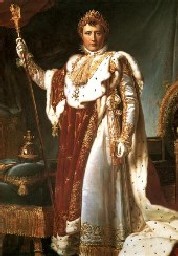|
By entering into an unholy alliance with American rebels as an act of revenge against Britain, the French
brought themselves to the point of bankruptcy, which induced such a crippling debt burden that many people in France began
to starve.
Despite this situation the ruling elite still thought they could yet again, tax the people out of the predicament. Their attitude was
not only hypocritical, but also ironic, as they had just sprung to the defence of Americans claiming resentment over
being taxed, while at the same time contemptuous to the fact, the French people were actually suffering 'real' hardship.
The backlash against further taxation was so great that the anti-royalist bourgeoisie (pseudo-intellectuals) in France
saw their opportunity to act as a spearhead for the people's anger and overwhelm the royal establishment.
The naeve thought the revolution would bring a fairer society to protect citizens from both government and the mob,
but power crazed ideologs seldom save the baby when throwing out the bathwater and so in their desire to change everything,
e.g the number of days in the week, the month names, street names, etc. no one was sure when and when not they were suppose
to be at work, the time of the year and where anywhere was.
Life became so stressful for the majority, fearing the mobs as they rooted out supposed aristocratics and
clergy to execute, (an emulation of rebel persecution of loyalists in America) that the scene was set for a
dictator to take over.
 Enter Napoleon, who was born in Corsica and rose to prominence via being an artillery officer in the French army at the time of
the revolution, he proved to be extremely brave, always leading from the front and was quickly promoted to General. As such he proved
himself a brilliant tactician, successfully
leading French forces against a number of campaigns, mounted by neighbouring powers trying to restore a more traditional government.
Enter Napoleon, who was born in Corsica and rose to prominence via being an artillery officer in the French army at the time of
the revolution, he proved to be extremely brave, always leading from the front and was quickly promoted to General. As such he proved
himself a brilliant tactician, successfully
leading French forces against a number of campaigns, mounted by neighbouring powers trying to restore a more traditional government.
With the removal of the aristocrats, his successes propelled him into a powerful position, but his ruthless ambition led him
to mount a coup in overthrowing the revolutionary government that had promoted him.
He gave himself control over all affairs,
which he used to convert France into a military machine in order to conquer most of Europe and spread his doctrine, only
Britain (thanks to the Royal Navy) stood beyond his control.
To maintain his momentum he conscripted approx 80,000 expendable men a year, which he justified by constantly generating
an atmosphere of fear of something or other, mainly the threat of being invaded.
After five years of him dominating Eupore, he crowned himself Emperor (i.e. Sacred Supreme Ruler), but coming from
a lowly unrefined origin, a dictator was probably a more apt title. France therefore had come full circle, only it was no longer the
cultural centre of Europe.
His reign started to come to an end when his invasion of Russia in 1812 went disastrously wrong and he had
to abdicate two years later, then shortly after regaining control of France in 1815, he met his nemesis, Wellington at Waterloo.
He was held prisoner on the south Atlantic island of St Helena for six years, where despite all the conspiracy theories to the contrary,
he died of stomach cancer.
France could never revert to it's pre-revolutionary state, so with it's influence in the EU today, has meant his
ideology is evident at it's core. He is also still revered by the French.

HomePage.

|



